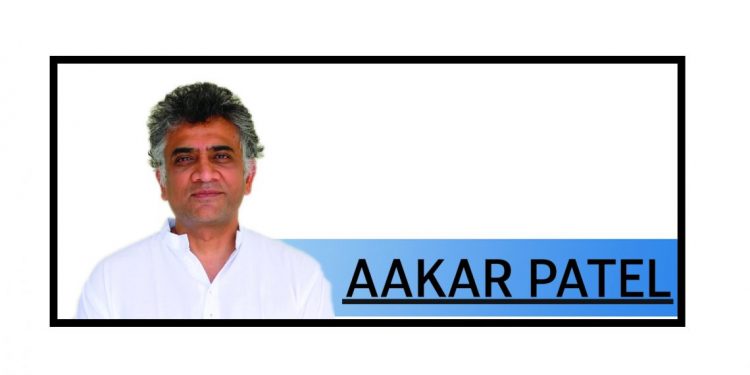Aakar Patel
The NDA crossed 100 Rajya Sabha seats on Friday, further consolidating the BJP as India’s dominant political force in its 40th year. The Bharatiya Janata Party was formed in April, 1980, after its members were expelled from the Janata Party, the joint Opposition force that was launched three years before that to counter an authoritarian Indira Gandhi. One of the components of the Janata Party was the Bharatiya Jana Sangh, launched in 1951.
According to its own record, the Jana Sangh was the result of three events. First the death of Vallabhai Patel in December 1950, second the resignation of Shyama Prasad Mookerjee from the Nehru government the same year, and the election also in 1950 and subsequent forcing out of PD Tandon as Congress president. Tandon was seen as a Hindu conservative opposed to Nehru’s secularism and after Patel’s death, Nehru forced Tandon to resign.
Another event, also acknowledged by the Jana Sangh as being important to its formation, was the banning of the Rashtriya Swayamsevak Sangh after the murder of Gandhi in 1948 and the arrest of its leader MS Golwalkar. The RSS not registered as a political organisation and the ban was lifted in 1949, on the condition that the RSS adopt a constitution, which it agreed to do.
At this point, inside the RSS, and published in its mouthpiece the Organiser, there began a series of articles arguing why the RSS should participate in politics. Golwalkar’s solution was to not make the RSS itself a political body but to allow workers to set up a party.
They joined SP Mookerjee, who had been previously the head of the Hindu Mahasabha, and the Bharatiya Jana Sangh was formed with Mookerjee as its leader. Golwalkar asked some of his people to join the party’s structure, including Deen Dayal Upadhayay, who was a pracharak in Uttar Pradesh. Later Atal Bihari Vajpayee and LK Advani, who was writing film reviews for Organiser, were also asked to join.
The RSS was already a quarter century old at this point and had spread well beyond Nagpur. It was thus able to provide the necessary frame for the Jana Sangh to be present in several states at the point of its launch. Mookerjee was a former Cabinet minister but had a base only in Bengal. The death of Mookerjee in 1953 meant that the RSS could take control of the party.
In India’s first elections the Jana Sangh won only a handful of seats and this continued to be the case till the 1970s when under Vajpayee it merged into the Janata Party with the rest of the Opposition.
When the Sangh members were expelled and had to make a new party in 1980, Vajpayee rejected the call to rename it the Bharatiya Jana Sangh. He said they had learned from the experience of being part of a larger group. The two changes that came from this was that first, the Bharatiya Janata Party (as it was named by Vajpayee) would expand its cadre and take non-RSS individuals. Second, the BJP’s constitution would be different from the Jana Sangh’s and it would promise allegiance to India’s secularism and socialism. This is still a unique feature in both the BJP’s constitution and the oath that it makes all its members sign.
This party also did not do well and got only 2 seats in the 1984 elections in which the Congress under Rajiv Gandhi demolished the Opposition. What changed the fortunes of the party was a movement launched by the Vishwa Hindu Parishad to be allowed to pray at the Babri Masjid, where two idols of Ram and Sita were placed in December 1949.
The oath to secularism was ignored and under its new president Advani, the party adopted the VHP demand, though Ayodhya had been on the manifesto of neither the Jana Sangh, which was formed the year only months after the idols were placed inside the mosque, or the BJP up to that point in time.
The polarisation that Advani produced in Indian society with his decision to pursue the Ayodhya project finally gave the RSS the sort of success they would looking for and the BJP won 85 seats in 1989. They took part in another coalition called the Janata Dal but this time supported it from outside. When the government collapsed, Advani returned to the Babri issue, finally leading a mob to it in December 1992, which demolished it and 2,000 Indians died in the riots following.
After the demolition and the violence, the party increased its popularity further and under Vajpayee, who was back in charge, it doubled its tally to 182 in the 1998 election. It got stuck here, winning 180 in the next one in 1999 and then slipping to 138 in 2004.
The BJP had moved away from its Ayodhya and anti-Muslim positions substantially when in power. What changed were the riots in Gujarat in 2002 after which Vajpayee tried unsuccessfully to oust Modi as chief minister. What happened next was the classic example of what takes place in ideological parties. The leader is always vulnerable to the person who is more extreme than he is and is charismatic. Thus, after Vajpayee failed to wrestle Modi down the writing was on the wall. Modi’s acceleration of the BJP away from its constitutional promise of secularism produced a profit and the BJP doubled again to over 300 seats in 2019.
The story of the party seems complex but in many ways it is quite simple. And the story, which began in Bengal with Mookerjee, is poised to return to that state very soon.






































